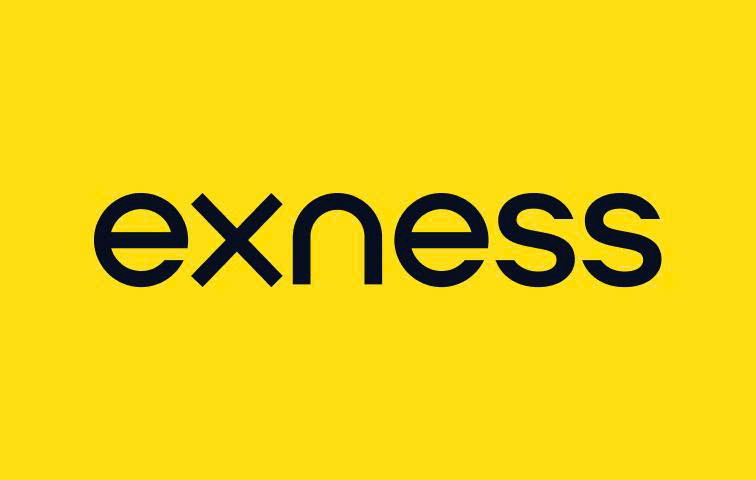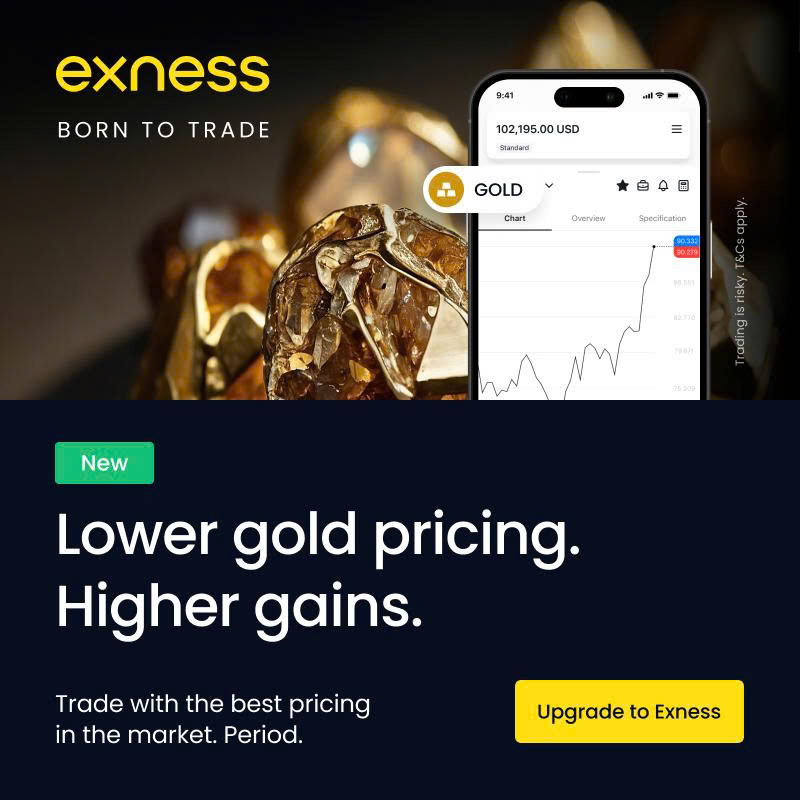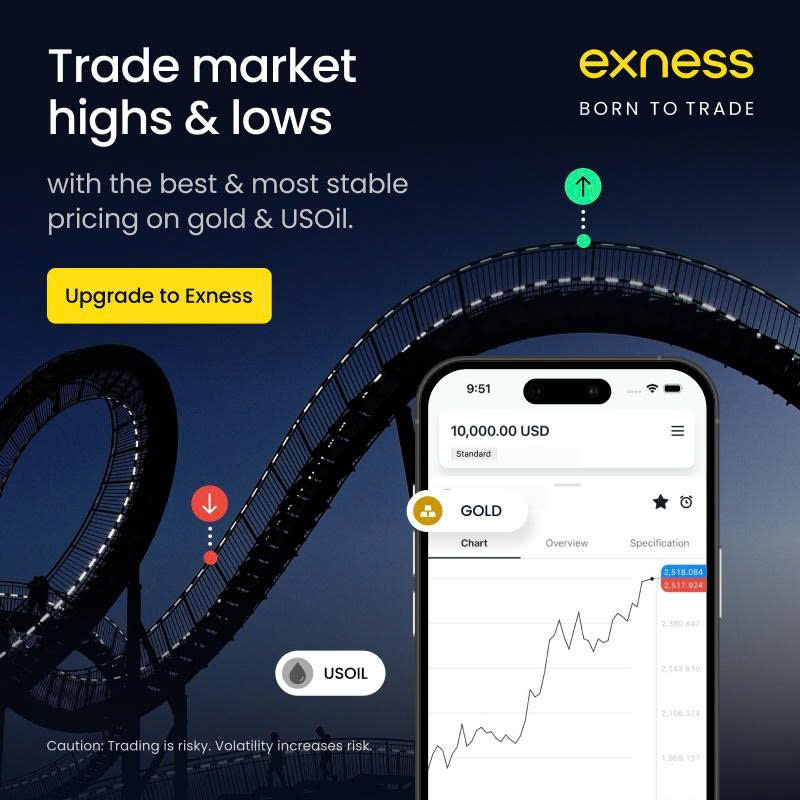
10 minute read
Is Exness an ECN Broker? A Comprehensive Analysis for Traders
from Exness
by Exness Blog
In the dynamic world of forex trading, selecting the right broker is a pivotal decision that can significantly impact your trading success. One question that frequently arises among traders is whether Exness, a globally recognized forex and CFD broker, operates as an Electronic Communication Network (ECN) broker. This article provides an in-depth exploration of Exness’s trading model, clarifies what an ECN broker is, evaluates Exness’s account types and execution methods, and helps traders determine if Exness aligns with their trading goals in 2025. With a focus on transparency, execution speed, and cost efficiency, this guide is tailored for both novice and experienced traders seeking clarity on Exness’s status as an ECN broker.

💥 Trade with Exness now: Open An Account or Visit Brokers 🏆
What is an ECN Broker?
Before diving into Exness’s operations, it’s essential to understand what an ECN broker is and why it matters. An Electronic Communication Network (ECN) broker facilitates direct trading between market participants, such as banks, financial institutions, hedge funds, and individual traders, through an electronic network. Unlike traditional market maker brokers, who may take the opposite side of a client’s trade, ECN brokers act as intermediaries, connecting traders to a pool of liquidity providers for real-time order execution.
Key characteristics of an ECN broker include:
· Direct Market Access: Orders are routed directly to the interbank market, ensuring trades are executed at the best available market prices.
· Variable Spreads: Spreads fluctuate based on market conditions, often tightening during high liquidity and widening during volatility.
· Transparency: Traders gain real-time visibility into bid and ask prices from multiple liquidity providers, reducing the risk of price manipulation.
· No Conflict of Interest: ECN brokers earn revenue through commissions rather than profiting from clients’ losses.
· Fast Execution: Orders are processed instantly, making ECN brokers ideal for scalpers and high-frequency traders.
These features make ECN brokers a preferred choice for traders who prioritize transparency, speed, and competitive pricing. But does Exness fit this model? Let’s explore its operations to find out.
Exness: A Brief Overview
Founded in 2008, Exness has grown into one of the leading forex and CFD brokers, serving over 1 million active traders across 180+ countries. Headquartered in Limassol, Cyprus, Exness is regulated by multiple reputable authorities, including:
· Cyprus Securities and Exchange Commission (CySEC): Ensures compliance with European financial standards.
· Financial Conduct Authority (FCA): Oversees Exness’s operations in the UK.
· Financial Services Authority (FSA): Regulates Exness in Seychelles.
· Financial Sector Conduct Authority (FSCA): Governs operations in South Africa.
Exness offers a wide range of trading instruments, including forex pairs, commodities, indices, cryptocurrencies, and stocks CFDs. With platforms like MetaTrader 4 (MT4), MetaTrader 5 (MT5), and its proprietary Exness Terminal and Exness Trade App, the broker caters to diverse trading styles. Its reputation for competitive spreads, instant withdrawals, and robust regulation makes it a popular choice among traders worldwide.
However, to determine whether Exness is an ECN broker, we need to examine its execution model, account types, and trading conditions in detail.
Exness’s Execution Model: ECN, Market Maker, or Hybrid?
Exness does not explicitly market itself as a “pure ECN broker.” Instead, it operates a hybrid execution model that blends elements of both ECN and market maker systems. This approach allows Exness to cater to a broad spectrum of traders, from beginners seeking simplicity to professionals requiring advanced execution. The hybrid model means that the execution method varies depending on the account type selected, with some accounts offering ECN-like conditions and others leaning toward a market maker structure.
To understand Exness’s execution model, let’s break down its account types and how they align with ECN principles.
Exness Account Types and Execution Methods
Exness offers a variety of account types tailored to different trading needs, including Standard, Standard Cent, Pro, Raw Spread, and Zero accounts. Here’s how they stack up in terms of ECN characteristics:
· Standard and Standard Cent Accounts:
· Execution Type: Market execution.
· Spreads: Competitive but wider compared to professional accounts, starting from 0.3 pips.
· Commissions: No commissions, as costs are built into the spread.
· ECN Compatibility: These accounts operate more like a market maker model, where Exness may process orders internally or through its liquidity pool. There’s no direct market access, making them less aligned with ECN standards.
· Pro Account:
· Execution Type: Instant or market execution, depending on the instrument.
· Spreads: Low, starting from 0.1 pips.
· Commissions: No commissions.
· ECN Compatibility: While the Pro account offers tight spreads and fast execution, the use of instant execution for some instruments suggests a hybrid approach with market maker tendencies rather than pure ECN execution.
· Raw Spread Account:
· Execution Type: Market execution with direct market access.
· Spreads: Ultra-low, starting from 0.0 pips.
· Commissions: Fixed commission per lot.
· ECN Compatibility: This account closely resembles ECN conditions, offering raw market pricing from liquidity providers and transparency in pricing. The commission-based structure aligns with ECN brokers’ revenue model.
· Zero Account:
· Execution Type: Market execution with direct market access.
· Spreads: Zero spreads on major pairs for most of the trading day.
· Commissions: Commission per lot.
· ECN Compatibility: The Zero account mirrors ECN characteristics, providing near-zero spreads and direct access to liquidity providers, making it a strong contender for ECN-like trading.
Based on this analysis, Exness’s Raw Spread and Zero accounts exhibit ECN-like features, such as direct market access, ultra-low spreads, and commission-based pricing. However, the Standard and Pro accounts lean toward a market maker model, with internalized order processing in some cases. This hybrid approach allows Exness to offer flexibility but complicates its classification as a pure ECN broker.
Is Exness a True ECN Broker?
To determine whether Exness qualifies as a true ECN broker, we must compare its operations to the defining traits of ECN brokers:
· Direct Market Access: Exness claims to aggregate prices from a network of top-tier banks and liquidity providers, particularly for its Raw Spread and Zero accounts. This suggests direct market access, a hallmark of ECN brokers. However, Exness doesn’t fully disclose the extent of its liquidity pool or whether all orders are routed to the interbank market, which raises some ambiguity.
· No Dealing Desk (NDD): True ECN brokers operate a no-dealing-desk environment, ensuring no interference with trades. Exness states that its Raw Spread and Zero accounts operate without a dealing desk, aligning with ECN standards. However, Standard accounts may involve internalized orders, indicating a dealing desk for certain trades.
· Transparency: ECN brokers provide real-time market depth and order book visibility. Exness offers transparent pricing on its professional accounts, with raw spreads reflecting market conditions, but it doesn’t explicitly provide order book visibility.
· Commissions: ECN brokers typically charge commissions rather than relying on spread markups. Exness’s Raw Spread and Zero accounts follow this model, charging a fixed commission per lot, while Standard accounts rely on spread-based pricing.
· Execution Speed: Exness is known for its fast execution speeds, with slippage rates below 1% for certain instruments, which aligns with ECN brokers’ focus on instant execution.
While Exness’s Raw Spread and Zero accounts closely resemble ECN conditions, its hybrid model and lack of explicit branding as a “pure ECN broker” prevent it from being classified as such across all accounts. Instead, Exness offers ECN-like trading for professional accounts, making it a viable option for traders seeking ECN benefits without committing to a fully ECN broker.

💥 Trade with Exness now: Open An Account or Visit Brokers 🏆
Pros and Cons of Trading with Exness as an ECN-Like Broker
Pros
· Competitive Spreads: Raw Spread and Zero accounts offer spreads starting from 0.0 pips, ideal for cost-conscious traders.
· Fast Execution: Exness’s execution speeds are among the fastest in the industry, supporting scalping and high-frequency trading.
· No Conflict of Interest: On Raw Spread and Zero accounts, Exness does not take the opposite side of trades, aligning with ECN principles.
· Regulatory Oversight: Multiple licenses from CySEC, FCA, and FSCA ensure a secure and transparent trading environment.
· Flexible Account Options: Traders can choose between ECN-like accounts (Raw Spread, Zero) or market maker accounts (Standard, Pro) based on their needs.
· Instant Withdrawals: Exness processes over 98% of withdrawals instantly, enhancing trader convenience.
Cons
· Not a Pure ECN Broker: Exness’s hybrid model means that not all accounts offer ECN execution, which may confuse traders seeking a true ECN experience.
· Limited Transparency on Liquidity: Exness doesn’t fully disclose its liquidity pool, which could raise questions about the depth of market access.
· Commission Costs: While Raw Spread and Zero accounts offer low spreads, commissions may increase trading costs for high-volume traders compared to some pure ECN brokers.
· Standard Accounts Less Competitive: Standard accounts lack direct market access, making them less suitable for traders prioritizing ECN features.
Comparing Exness to Other ECN Brokers
When compared to pure ECN brokers like IC Markets or Pepperstone, Exness’s hybrid model stands out for its flexibility but falls short in terms of pure ECN execution across all accounts. For example:
· IC Markets: A well-known ECN broker, IC Markets offers true ECN execution with full market depth visibility and lower commissions on certain accounts. However, its minimum deposit is higher than Exness’s $1 for Standard accounts.
· Pepperstone: Another pure ECN broker, Pepperstone emphasizes transparency and direct market access across all accounts. Its commission structure may be more competitive than Exness’s for high-volume traders.
· Exness: Offers ECN-like conditions on Raw Spread and Zero accounts, with the added benefit of instant withdrawals and flexible leverage (up to 1:2000 in some jurisdictions). However, its Standard accounts operate more like a market maker model.
For traders prioritizing ECN-like conditions with low minimum deposits and instant withdrawals, Exness’s Raw Spread and Zero accounts are highly competitive. However, those seeking a pure ECN experience may prefer brokers like IC Markets or Pepperstone.
Conclusion: Is Exness Right for You?
Whether Exness is the right broker depends on your trading style, experience level, and priorities. Here’s a breakdown of who might benefit from Exness’s ECN-like accounts:
· Scalpers and High-Frequency Traders: The Raw Spread and Zero accounts offer ultra-low spreads and fast execution, ideal for strategies requiring precision and speed.
· Cost-Conscious Traders: With no deposit or withdrawal fees and competitive spreads, Exness minimizes trading costs.
· Beginners: Standard accounts provide a user-friendly entry point with no commissions, though they lack ECN features.
Advanced Traders: The Pro, Raw Spread, and Stuart by Exness’s hybrid model, which blends ECN and market maker elements, offers a versatile trading environment that caters to diverse needs. Traders seeking ECN-like conditions should focus on the Raw Spread and Zero accounts, which provide direct market access, ultra-low spreads, and commission-based pricing. While not a pure ECN broker, Exness offers a compelling alternative for traders prioritizing transparency, speed, and cost efficiency. By understanding its execution model and account offerings, you can make an informed decision about whether Exness aligns with your trading goals.
💥 Note: To enjoy the benefits of the partner code, such as trading fee rebates, you need to register with Exness through this link: Open An Account or Visit Brokers 🏆
Read more:

